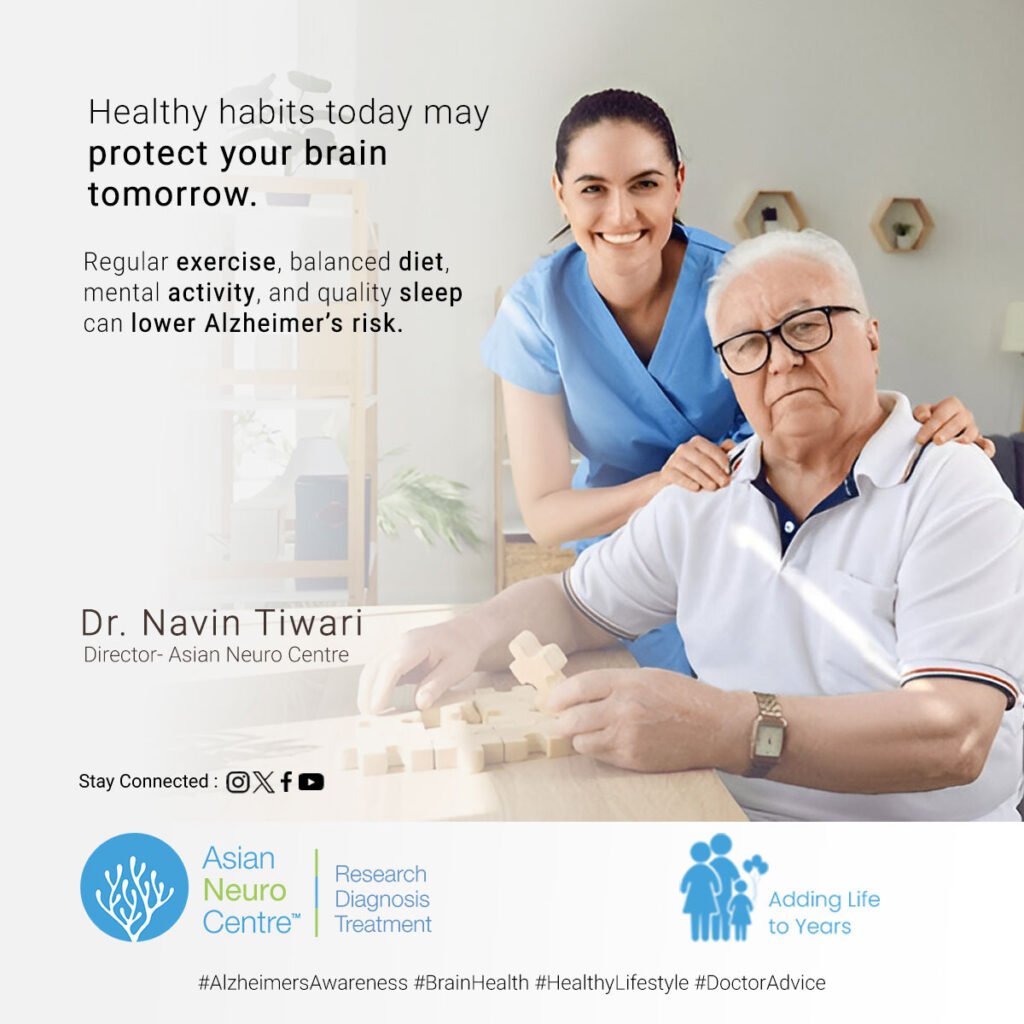- Have any questions?
- 911 12345 29
- info@asianneurocentre.com
Can Lifestyle Changes Delay Alzheimer’s?
Alzheimer’s Care Tips for Families – Dr. Navin Tiwari
September 10, 2025What Happens When You Are Diagnosed with Parkinson’s?
September 27, 2025Can Lifestyle Changes Delay Alzheimer’s?
Alzheimer’s disease, a progressive neurological disorder, affects millions worldwide. While age and genetics remain the strongest risk factors, research increasingly shows that lifestyle choices can influence the onset and progression of Alzheimer’s.
Though there is no definitive cure, adopting healthy habits may delay its appearance or slow cognitive decline.

What is Alzheimer’s Disease
Alzheimer’s disease is characterized by memory loss, confusion, and difficulty with thinking and reasoning. It results from the build-up of abnormal proteins in the brain, which damages nerve cells and leads to a gradual cognitive decline.
Since prevention is more effective than treatment, scientists are exploring how lifestyle changes might help.
The Brain-Body Connection: What the Science Says.
The key to delaying Alzheimer’s lies in protecting and nourishing our brain health. Lifestyle changes impact the brain by improving blood flow, reducing inflammation, and building “cognitive reserve”—the brain’s ability to withstand damage.
Factors linked to cardiovascular health, such as high blood pressure and diabetes, are also strongly associated with a heightened risk of dementia. By addressing these factors through healthy habits, we can create a more resilient brain.
The Role of Lifestyle in Brain Health
- Physical Activity: Regular exercise is not only good for the body but also for the brain. Aerobic activities such as walking, swimming, or cycling improve blood flow and increase oxygen supply to the brain. Studies suggest that people who exercise regularly have a lower risk of developing Alzheimer’s, as it promotes the growth of new brain cells and enhances memory.
- Balanced Nutrition: Diet plays a critical role in cognitive health. The Mediterranean and DASH diets, rich in vegetables, fruits, whole grains, fish, nuts, and olive oil, are associated with reduced Alzheimer’s risk. These foods provide antioxidants and omega-3 fatty acids that fight inflammation and protect brain cells. Avoiding processed foods, excess sugar, and trans fats can further safeguard memory function.
- Cognitive Engagement: Keeping the brain active is just as important as keeping the body fit. Engaging in puzzles, reading, learning new skills, or playing musical instruments stimulates brain connections. Mental challenges help build “cognitive reserve,” allowing the brain to adapt better to age-related changes.
- Quality Sleep: Sleep is essential for brain repair. Poor sleep patterns and sleep disorders are linked to increased amyloid plaque build-up, a hallmark of Alzheimer’s. Maintaining a regular sleep schedule and ensuring 7–8 hours of quality rest can reduce this risk.
- Social Interaction: Staying socially connected lowers stress and depression—two factors that can contribute to cognitive decline. Conversations, community activities, and strong emotional bonds keep the brain engaged and resilient.
- Managing Stress and Health Conditions: Chronic stress, uncontrolled diabetes, hypertension, and obesity are risk factors for Alzheimer’s. Stress management techniques like meditation, yoga, and mindfulness, combined with regular health check-ups, play a preventive role in brain health.
- Prioritizing Quality Sleep: Sleep is a time when the brain performs essential “cleanup.” During deep sleep, the brain’s glymphatic system actively removes toxic proteins, including beta-amyloid plaques, which are a hallmark of Alzheimer’s disease. Chronic poor sleep can impair this process and elevate your risk. Aim for 7-9 hours of restorative sleep each night by creating a consistent and relaxing bedtime routine.
Can Alzheimer’s Be Prevented Completely?
While lifestyle changes cannot guarantee prevention, they significantly reduce the risk and may delay symptoms. Genetics and age still play major roles, but adopting a brain-healthy lifestyle ensures better overall well-being and enhances quality of life.
Conclusion
Alzheimer’s disease remains one of the most challenging health conditions of our time. However, evidence suggests that lifestyle changes—regular exercise, a balanced diet, cognitive engagement, restful sleep, social activity, and stress management—can delay its onset or slow progression.
While we may not yet have a cure, we do have powerful tools to strengthen brain health and maintain independence for longer.
Dr. Navin Tiwari
Consulting Neurologist
